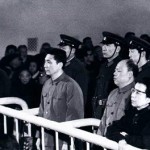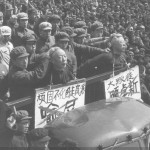Would you trade places with someone in China?
 I wouldn’t. Not with a peasant farmer. Not with an industrial worker. Not with a factory owner. Not with the Premier.
I wouldn’t. Not with a peasant farmer. Not with an industrial worker. Not with a factory owner. Not with the Premier.
Not in a million years.
I bet most Americans would agree.
It’s important to keep that in mind, I think, when listening to the endless hyper-ventilation in this country about China’s emerging pre-eminence.
Former Secretary of State Henry Kissinger is the latest scribe — a big one no less — to caution America to be on its best behavior with the all-powerful People’s Republic of China, lest they perceive something – anything – we do as sign of disrespect. His piece in The Washington Post today warns of risking “cold war” with the Middle Kingdom if we don’t capitulate to more Chinese demands.
Here’s how the good doctor put it: “The aim should be to create a tradition of respect and cooperation so that the successors of leaders meeting now continue to see it in their interest to build an emerging world order as a joint enterprise.”
In other words: Ignore China’s human rights abuses and carve up the globe between us. (Kissinger always was a big thinker.)
How quickly things change.
When I was a kid, China was the faraway land cited to make my brothers and sisters and me eat peas: “Think of the children starving in China,” I would be admonished, a forkful of green mush pressed against my lips. And rightly so. An estimated 20-40 million people starved to death in China between 1958 and 1961 because of inane government policies.
China has come a long way since then, but let’s not convince ourselves that it has manifest destiny or some ancient Asian wisdom on how to conquer history. That cocktail party cliché — “we think about tomorrow; the Chinese think 1,000 years ahead”– is just plain hogwash.
When Americans were building interstate highways, public universities, and sprawling, model neighborhoods, the Chinese were burning books, smashing violins, and exterminating Shar Peis in the streets (their Western stench was too much.) Had history stopped then, the culmination of thousands of years of Chinese culture would have been death squads and chaos.
And let’s not pretend that was all part of a long-term plan. One of Mao’s many mottos of the Cultural Revolution, stamped onto millions of Chinese cigarette packs: “Support agriculture on a great scale.”
Clearly he was onto China’s industrial success to come. Clever bastard.
There are many reasons to be wary of China’s advances, not the least of which is its growing naval power. The Chinese just developed surface to ship missiles and are reportedly working on their first aircraft carrier, which could one day challenge U.S. dominance on the high seas in the Pacific.
But more worrisome than that – even more than the amount of U.S. debt it holds – is its diplomatic attitude. China’s deliberate snubs of President Obama in the past two years, beginning at the climate summit in Copenhagen in December 2009, when China’s Premier Wen Jiabao twice stood up the U.S. President at meetings, raised eyebrows across the globe.
Its growing navy is that snub weaponized. They smell our weakness and are probing our resolve, which is exactly why we can’t coddle them as Dr. Kissinger advises today.
China is in a good negotiating position, but it will face internal problems of its own. It may be an ancient culture, but it’s way new at free market capitalism. And as the Chinese middle class grows, and freedom and expectations begin to take hold, it will be interesting to see how the authoritarians make out.
Or maybe Mao planned for that, too.
In the meantime, we shouldn’t let them psyche us out on the world stage. Because who’s shoes would you rather be in, theirs or ours? I’d take ours every day, even with the cracks in our soles.



Great line “…even with the cracks in our soles.”